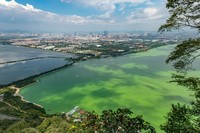How animal waste is helping turn China's lakes green
The Guardian - Animal husbandry is contaminating China’s water and has been linked to turning lakes bright green, a phenomenon known as eutrophication.
 The farm, located at the end of a narrow dirt path, announces its presence with a piercing stench. At first, the caretaker of the collective facility in Kunming says the farm recycles all the animal waste into manure fertiliser. But later, he sheepishly points behind the pigsty.
The farm, located at the end of a narrow dirt path, announces its presence with a piercing stench. At first, the caretaker of the collective facility in Kunming says the farm recycles all the animal waste into manure fertiliser. But later, he sheepishly points behind the pigsty.
There, hordes of flies swarm above a festering field of grey-black dung. A few times a month, Cai shovels the steaming excrement produced by some 100 swine owned by local families into a nearby creek, where a mile downstream, villagers fish on the rocky shores of a small lake.
The hilltop fishing spot feeds into Dianchi Lake in south-western Yunnan province, a major tourist attraction and one of China’s largest fresh water bodies. Dianchi is famous for a number of reasons: its sheer size (nearly 40km long), its distinctive “crescent moon” shape and the surrounding scenic hills and rock gardens. But it has another distinguishing feature; for several decades, each summer the surface of Dianchi has turned bright green from algae blooms caused by excess nutrients such as nitrogen and phosphorus – a largely manmade phenomenon known as eutrophication.
Eutrophication plagues areas around the world where rapid urbanisation and agricultural growth has taken place near bodies of water. When it rains, chemicals from cities, factories and fertilisers or untreated animal waste on farms can wash into lakes, streams and rivers. The extra nutrients feed algae on the surface of the water that can proliferate enough to block light. This deprives organisms of the light they need to photosynthesise. In the UK, for example, Tamar Lakes in south-western England suffered intense eutrophication pollution between 1975 and the 2000s, and the phenomena is also widespread in estuaries and coastal areas in the US.
Polluted water is a chronic problem in China, with citizens increasingly speaking out in frustration and even suing the government. In early 2013, some 16,000 dead pigs (including corpses infected by porcine circovirus) floated to Shanghai along the Huangpu river – a grisly sight that raised public concern about both unethical agricultural practices and water contamination. Some local governments have resorted to digging deeper wells to reach safe water, following an official survey finding as much as 80% of groundwater in major river basins is unsafe for human consumption.


